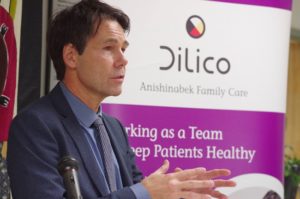Dilico announces provincial government’s Indigenous midwifery initiative

By Rick Garrick
FORT WILLIAM—Two new Indigenous midwives are being hired to provide services at the Dilico Family Health Team Clinic in Fort William through Ontario’s recently announced Aboriginal Midwifery initiative.
“I really look forward to meeting the needs of women who aren’t currently accessing midwifery care,” says Lisa Bishop, an Indigenous registered midwife originally from Wikwemikong. “I was actually planning to become a physician, and then when I had my first child I had a midwife take care of me during my pregnancy. I decided that I really liked the relationship and the amount of care that midwives are able to provide women and I decided that would be more appropriate and more fulfilling for me personally.”
Bishop says there are a flood of emotions in the room when a baby is born.
“As a midwife, it is a relief when a baby is born because the mom was working so hard and she has been anticipating this baby for so long,” Bishop says. “And the flood of emotions from everybody in the family in the room who is there is a very miraculous event.”
Eric Hoskins, Minister of Health and Long-Term Care, announced the initiative on Feb. 9, at the Dilico Family Health Team Clinic in Fort William. The initiative calls for the provision of culturally appropriate child and maternity care for up to 30 Indigenous women and their children in the community over the next three years. The provincial government plans to invest up to $2 million to increase access to culturally appropriate midwifery care now and in the future.
“Aboriginal midwives play an important role in the health and well-being of Indigenous women, their children and their families,” Hoskin says. “We’re committed to working with Indigenous partners to support culturally appropriate and safe health care services that meet the specific needs of their communities.”
Fort William Chief Peter Collins says the staff at Dilico and in the communities are always trying to improve health care for community members.
“It’s a great opportunity to create this program in our communities and keep our young people at home if that is the way they want to have their newborns,” Collins says. “It’s just a positive step in the right direction.”
The provincial government is also supporting the establishment of five other Indigenous midwifery programs through the initiative: K’Tigaaning Midwives in Powassan; Kenhte:ke Midwives in Tyendinaga Mohawk Territory; Onkwehon:we Midwives in Akwesasne; Shkagamik-Kwe Health Centre in Sudbury; and Southwest Ontario Aboriginal Health Access Centre in London.
“Expanding access to culturally appropriate midwifery care is helping to ensure Indigenous communities have access to child and maternity care that meets their needs,” says David Zimmer, Minister of Indigenous Relations and Reconciliation. “Supporting comprehensive and integrated care is one of the many steps on Ontario’s journey of healing and reconciliation with Indigenous peoples.”
The provincial government is also offering development grants for exploring future sites for Indigenous midwifery services to organizations in Cornwall, Cutler, Fort Frances, Keewatin, Kenora, Nestor Falls, Oshawa, Thamesville, and Thunder Bay.
“Today’s announcement will greatly benefit Aboriginal maternal and child health and marks an important step in efforts towards reconciliation and restoring birth to Aboriginal communities,” says Ellen Blais, policy analyst, Aboriginal Midwifery, Association of Ontario Midwives. “Indigenous midwives are now able to have the resources available to work on their traditional territories and lands and for the families that belong to individual nations across Ontario.”
Ontario is also investing an additional $27.3 million in 89 midwifery practice groups across the province, helping to provide midwifery services for an additional 4,053 births in Ontario.


